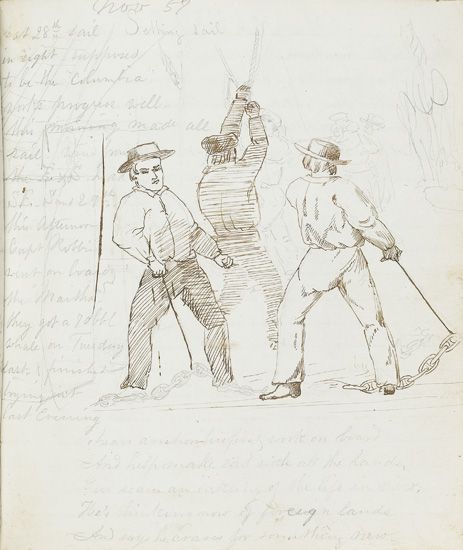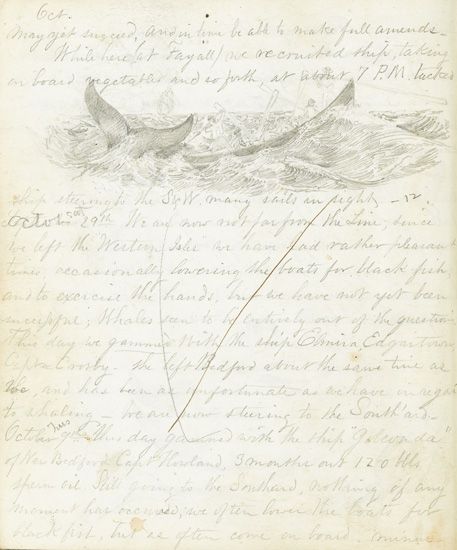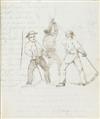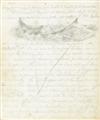Sale 2241 - Lot 288
Price Realized: $ 11,000
Price Realized: $ 13,200
?Final Price Realized includes Buyer’s Premium added to Hammer Price
Estimate: $ 5,000 - $ 7,500
"HE TURNED SIDEWAYS, BRINGING HIS JAWS UNDER OUR BOWS--CRACK, CRACK" (WHALING.) Weir, Robert W., Jr. Journal kept at sea by a runaway from a renowned family of artists. Autograph Manuscript, generously illustrated. 128 pages. 4to, 1/4 calf, moderate wear; entries not completely chronological, several pages partially or completely missing. Vp, 18 August 1855 to 1858
Additional Details
Robert Walter Weir, Jr. (1836-1905) was the son of a prominent Hudson Valley School landscape painter who taught at West Point. His younger brothers John and Julian would also go on to successful careers in art. Robert, however, was a restless soul, and signed on at the age of 19 as a crewman on the Mattapoisett, MA whaling bark Clara Bell (see Starbuck, page II:528). This journal is a first draft of his experiences. His initial plan seems to have been to keep a journal in the front of the book, and use the remainder as a sketchbook. Soon the journal entries overtook the sketches, wrapping around them or even overwriting some of the fainter pencil studies. A later effort to place years to the entries seems to be somewhat unreliable. Weir later transcribed and edited his journal into a fresh volume, with illustrations based on some of the sketches here. This explains the pencil or ink slash marks through most of the entries in the present volume. The edited version is in the collection of Mystic Seaport.
Weir came from a more sheltered background than the average green hand. On his second day at sea, he wrote "Beginning to get sea sick & disgusted; we have to work like horses & live like pigs" (21 August 1855). He thinks back frequently to his family in West Point: "I had pleasant thoughts of those I left so very unkindly & abruptly, but I console myself that it will be some relief to dear father that I am off his hands" 26 August 1855). "It gives me great relaxation when I am on the lookout at the masthead to sing over those pleasant songs dear Emma & I used to sing so much at home for the amusement of father & all visitors" (30 August 1855). "Now that I have lost my home I can fully realize what a happiness it is to have a pleasant home, where brothers, sisters, and father & mother can always be near. But for me, I have forever lost my home. My father! Oh! How I have wronged you" (13 September 1855).
The whaling entries are, of course, a highlight. One undated page-long begins "All hands on deck! Anon, the cry is heard. There blows! There blows! Excitement now prevails. Each heart leaps high with the expected sport." "We now tried hard to give him a lance and after much maneuvering succeeded when the whale immediately turned upon us. He turned sideways bringing his jaws under our bows--crack, crack. The boat is capsized & everybody in the water" (9 December 1857?). "We were going head & head onto a big fellow. I got up and gave it to him--whiz, whiz. It seemed but a moment and all the line was out of our tubs, 160 fathoms. I hold the turn, he shortly slacks, and again comes up to blow" (6 January 1857).
The illustrations make this journal special. Unlike the naïve work more typically seen in a sea journal, Weir's drawings are clearly done by a trained hand with considerable natural aptitude. Most pages have drawings, with some pages having several. Many of the drawings depict shipboard life, including a scene of whaleboats taking in a prize. Others are landscapes or portraits of people he met on shore, such as "Prince Selim Hassan, my guide in Zanzibar," or an untitled sketch of two women in Madagascar pounding corn in a tree-trunk pestle, which he later reprised in his edited journal. He doodled patriotic symbols, women he recalled from home, three carefully rendered maps of his voyages, and whatever else caught his imagination.
Weir later served in the United States Navy during the Civil War, sending dispatches to Harper's Weekly. He did a bit of book illustration after the war, some of it on whaling topics, but eventually settled down as an engineer in New Jersey, leaving this lively testament to his youthful adventures at sea.
Weir came from a more sheltered background than the average green hand. On his second day at sea, he wrote "Beginning to get sea sick & disgusted; we have to work like horses & live like pigs" (21 August 1855). He thinks back frequently to his family in West Point: "I had pleasant thoughts of those I left so very unkindly & abruptly, but I console myself that it will be some relief to dear father that I am off his hands" 26 August 1855). "It gives me great relaxation when I am on the lookout at the masthead to sing over those pleasant songs dear Emma & I used to sing so much at home for the amusement of father & all visitors" (30 August 1855). "Now that I have lost my home I can fully realize what a happiness it is to have a pleasant home, where brothers, sisters, and father & mother can always be near. But for me, I have forever lost my home. My father! Oh! How I have wronged you" (13 September 1855).
The whaling entries are, of course, a highlight. One undated page-long begins "All hands on deck! Anon, the cry is heard. There blows! There blows! Excitement now prevails. Each heart leaps high with the expected sport." "We now tried hard to give him a lance and after much maneuvering succeeded when the whale immediately turned upon us. He turned sideways bringing his jaws under our bows--crack, crack. The boat is capsized & everybody in the water" (9 December 1857?). "We were going head & head onto a big fellow. I got up and gave it to him--whiz, whiz. It seemed but a moment and all the line was out of our tubs, 160 fathoms. I hold the turn, he shortly slacks, and again comes up to blow" (6 January 1857).
The illustrations make this journal special. Unlike the naïve work more typically seen in a sea journal, Weir's drawings are clearly done by a trained hand with considerable natural aptitude. Most pages have drawings, with some pages having several. Many of the drawings depict shipboard life, including a scene of whaleboats taking in a prize. Others are landscapes or portraits of people he met on shore, such as "Prince Selim Hassan, my guide in Zanzibar," or an untitled sketch of two women in Madagascar pounding corn in a tree-trunk pestle, which he later reprised in his edited journal. He doodled patriotic symbols, women he recalled from home, three carefully rendered maps of his voyages, and whatever else caught his imagination.
Weir later served in the United States Navy during the Civil War, sending dispatches to Harper's Weekly. He did a bit of book illustration after the war, some of it on whaling topics, but eventually settled down as an engineer in New Jersey, leaving this lively testament to his youthful adventures at sea.
Exhibition Hours
Exhibition Hours
Aliquam vulputate ornare congue. Vestibulum maximus, libero in placerat faucibus, risus nisl molestie massa, ut maximus metus lectus vel lorem.






